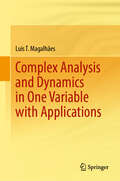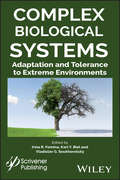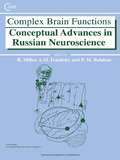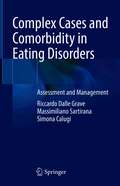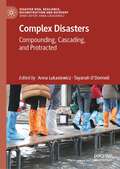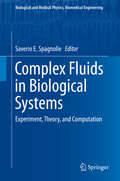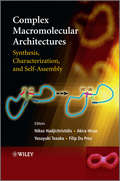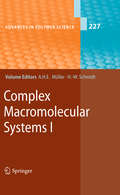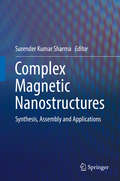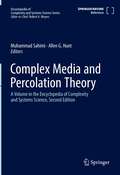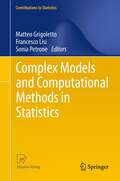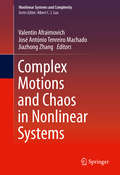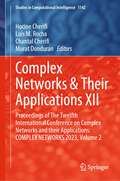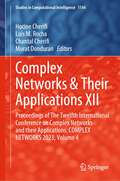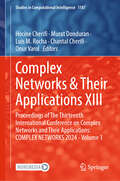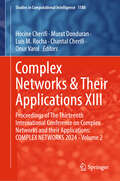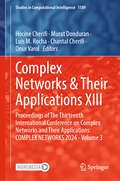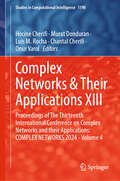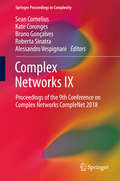- Table View
- List View
Complex Analysis and Dynamics in One Variable with Applications
by Luis T. MagalhãesThis textbook has been designed to support the initial study of Complex Analysis, progressing to Complex Dynamics. It focuses on the fundamental aspects of one-variable complex functions, covering the geometric theory and dynamics of iterations of rational mappings. Following the standard material, the book delves into an extensive range of advanced topics, encompassing the requirements for a one-year graduate-level course or a preliminary exam. In this work, the reader will discover three distinctive characteristics: it simplifies and unifies ideas and concepts that might appear disparate or complicated in real analysis; it contributes to the development of other areas in mathematics; and it showcases relevance for applications in Science and Engineering, with many exercises. Historical notes throughout the text help to contextualize the theory. With its flexible structure, this textbook provides a solid foundation for a first course in Complex Analysis and for a second more advanced course, establishing a robust basis for subsequent studies.
Complex Biological Systems: Adaptation and Tolerance to Extreme Environments
by Irina R. Fomina Karl Y. Biel Vladislav G. SoukhovolskyGlobal climate change is one of the most serious and pressing issues facing our planet. Rather than a “silver bullet” or a single study that solves it, the study of global climate change is like a beach, with each contribution a grain of sand, gathered together as a whole to create a big picture, moving the science forward. This new groundbreaking study focuses on the adaptation and tolerance of plants and animal life to the harsh conditions brought on by climate change or global warming. Using the papers collected here, scientists can better understand global climate change, its causes, results, and, ultimately, the future of life on our planet. The first section lays out a methodology and conceptual direction of the work as a whole, covering the modeling, approaches, and the impacts studied throughout the book. The second section focuses on certain hypotheses laid out by the authors regarding how plants and animal life can adapt and survive in extreme environments. The third section compiles a series of ecological experiments and their conclusions, and a final section is dedicated to previous scientific breakthroughs in this field and the scientists who made them. Whether for the scientist in the field, the student, or as a reference, this groundbreaking new work is a must-have. Focusing on a small part of the global climate change “beach,” this “grain of sand” is an extremely important contribution to the scientific literature and a step forward in understanding the problems and potentialities of the issue.
Complex Brain Functions: Conceptual Advances in Russian Neuroscience
by R. Miller A. M. Ivanitsky P. M. BalabanThere are many difficulties hindering western scientists from becoming acquainted with Russian scientific literature, including both political and language barriers. Russian science has a long and proud tradition going back as far as Peter the Great and the founding of the Russian Academy of Science in 1725. However, Russian neuroscientists from th
Complex Cases and Comorbidity in Eating Disorders: Assessment and Management
by Massimiliano Sartirana Simona Calugi Riccardo Dalle GraveIn this book the authors share the strategies and procedures they use in their clinical daily practice to assess and treat complex cases of eating disorders. The strategic and pragmatic approach to the management of medical and psychiatric comorbidity coexisting with eating disorders, while relying on enhanced cognitive behavioral therapy (CBT-E) - an evidence-based treatment recommended for all eating disorder categories both in adults and adolescents-, can also be used by clinicians who adhere to different theoretical models. The book is divided into two main parts. Part I describes the eating disorder psychopathology and its consequences: an essential knowledge essential to understanding whether the patients have true comorbidity or spurious comorbidity. Then it gives an overview of CBT-E and how to implement it at different levels of care and in a multidisciplinary team. Part II illustrates the general strategies to address comorbidity in patients with eating disorders, and the specific strategies and procedures for managing the most common mental and general medical conditions coexisting with eating disorders. This volume is a valuable and useful tool for all clinicians - endocrinologists, nutritionists, dietitians, psychologists, psychiatrists - who deal with obesity and eating disorders.
Complex Contracting
by Matthew Potoski Trevor L. Brown Matthew Potoski David M. Van Slyke Trevor L. BrownComplex Contracting draws on core social science concepts to provide wide-ranging practical advice on how best to manage complex acquisitions. Using a strong analytical framework, the authors assess contract management practices, suggesting strategies for improvement and ways to avoid the pitfalls of managing contracts for large and sophisticated projects. An in-depth analysis of the US Coast Guard's Deepwater program is included to illustrate ways to respond to real-world contracting challenges. This high-profile and controversial case consisted of a projected 25-year, $24 billion contract through which the US Coast Guard would buy a system of new boats, aircraft, communications, and control architecture to replace its aging fleet. The authors explore the reasons why this program, launched with such promise, turned out so poorly, and apply the lessons learned to similarly complex contracting scenarios. This engaging and accessible book has broad applicability and will appeal to policymakers, practitioners, scholars and students.
Complex Disasters: Compounding, Cascading, and Protracted (Disaster Risk, Resilience, Reconstruction and Recovery)
by Tayanah O’Donnell Anna LukasiewiczThis Edited book introduces the concept of complex disasters and considers both disaster risks and impacts across the disaster management spectrum – Prevention – Preparation – Response and Recovery. Three types of complex disasters are analysed – ‘Compound’, ‘Cascading’ and ‘Protracted’. Case studies include hazards from fires, through to floods, sea level rise and typhoons are explored through case studies from Australia and the Asia Pacific region. Each is written by scholars and/or practitioners with acknowledged expertise in the field and most chapters are based on detailed case studies of ongoing or recent research projects. The book will be useful to researchers in climate, disaster, or environmental and economic policy, disaster risk reduction, and climate change studies, and practitioners and policy makers applying disaster theory and knowledge into policy and decision-making.
Complex Fluid-Flows in Microfluidics
by Francisco José Galindo-RosalesThis monograph contains expert knowledge on complex fluid-flows in microfluidic devices. The topical spectrum includes, but is not limited to, aspects such as the analysis, experimental characterization, numerical simulations and numerical optimization. The target audience primarily comprises researchers who intend to embark on activities in microfluidics. The book can also be beneficial as supplementary reading in graduate courses.
Complex Fluids in Biological Systems: Experiment, Theory, and Computation (Biological and Medical Physics, Biomedical Engineering)
by Saverio E. SpagnolieThis book serves as an introduction to the continuum mechanics and mathematical modeling of complex fluids in living systems. The form and function of living systems are intimately tied to the nature of surrounding fluid environments, which commonly exhibit nonlinear and history dependent responses to forces and displacements. With ever-increasing capabilities in the visualization and manipulation of biological systems, research on the fundamental phenomena, models, measurements, and analysis of complex fluids has taken a number of exciting directions. In this book, many of the world's foremost experts explore key topics such as: Macro- and micro-rheological techniques for measuring the material properties of complex biofluids and the subtleties of data interpretation Experimental observations and rheology of complex biological materials, including mucus, cell membranes, the cytoskeleton, and blood The motility of microorganisms in complex fluids and the dynamics of active suspensions Challenges and solutions in the numerical simulation of biologically relevant complex fluid flows This volume will be accessible to advanced undergraduate and beginning graduate students in engineering, mathematics, biology, and the physical sciences, but will appeal to anyone interested in the intricate and beautiful nature of complex fluids in the context of living systems.
Complex Hamiltonian Dynamics (Springer Series in Synergetics #10)
by Haris Skokos Tassos BountisThis book introduces and explores modern developments in the well established field of Hamiltonian dynamical systems. It focuses on high degree-of-freedom systems and the transitional regimes between regular and chaotic motion. The role of nonlinear normal modes is highlighted and the importance of low-dimensional tori in the resolution of the famous FPU paradox is emphasized. Novel powerful numerical methods are used to study localization phenomena and distinguish order from strongly and weakly chaotic regimes. The emerging hierarchy of complex structures in such regimes gives rise to particularly long-lived patterns and phenomena called quasi-stationary states, which are explored in particular in the concrete setting of one-dimensional Hamiltonian lattices and physical applications in condensed matter systems. The self-contained and pedagogical approach is blended with a unique balance between mathematical rigor, physics insights and concrete applications. End of chapter exercises and (more demanding) research oriented problems provide many opportunities to deepen the reader's insights into specific aspects of the subject matter. Addressing a broad audience of graduate students, theoretical physicists and applied mathematicians, this text combines the benefits of a reference work with those of a self-study guide for newcomers to the field.
Complex Human Dynamics: From Mind to Societies (Understanding Complex Systems)
by Andrzej Nowak Katarzyna Winkowska-Nowak David BréeThis book, edited and authored by a closely collaborating network of social scientists and psychologists, recasts typical research topics in these fields into the language of nonlinear, dynamic and complex systems. The aim is to provide scientists with different backgrounds - physics, applied mathematics and computer sciences - with the opportunity to apply the tools of their trade to an altogether new range of possible applications. At the same time, this book will serve as a first reference for a new generation of social scientists and psychologists wishing to familiarize themselves with the new methodology and the "thinking in complexity".
Complex Investigation of the World Ocean: Proceedings of the VII International Conference of Young Scientists (Springer Proceedings in Earth and Environmental Sciences)
by Tatiana ChaplinaThe book presents the most relevant research of the participants of the VII International Conference of Young Scientists "Complex Investigation of the World Ocean" (CIWO-2023). This conference was held at Saint Petersburg State University in May 15-19, 2023 (Saint Petersburg, Russia). It covers a wide range of fundamental and applied marine and limnology studies combined in eight sections: Ocean Physics, Ocean Biology, Ocean Chemistry, Marine Geology, Marine Geophysics, Marine Ecology and Environmental Management, Physical and Biological interactions (interdisciplinary section), Oceanological Technology and Instrumentation. The aim of this book is to show the relevance of the marine research due to the crucial role of the World Ocean in determining climate change on Earth, huge resources (fish resources, oil, gas and ore deposits, etc.) and intensive development of infrastructure in coastal and offshore zones. All these topics were marked within the framework of realization of the United Nations Decade of Ocean Science for Sustainable Development (2021-2030). The studies presented in the book covers the wide spectrum of different the most important marine and limnology issues: thermohaline structure of water body and interactions between ocean and atmosphere, dynamic of the ocean, marine ice in polar regions, biodiversity of the marine ecosystems, adaptation of marine life to climate changes, geological and geophysical investigations in oil and gas regions, sedimentation, paleooceanology and biostratigraphy, hydrochemistry of estuary regions and carbon fluxes, microplastic pollution of the ocean, eutrophication and etc.
Complex Macromolecular Architectures: Synthesis, Characterization, and Self-Assembly
by Nikos Hadjichristidis Akira Hirao Yasuyuki Tezuka Filip Du PrezThe field of CMA (complex macromolecular architecture) stands at the cutting edge of materials science, and has been a locus of intense research activity in recent years. This book gives an extensive description of the synthesis, characterization, and self-assembly of recently-developed advanced architectural materials with a number of potential applications. The architectural polymers, including bio-conjugated hybrid polymers with poly(amino acid)s and gluco-polymers, star-branched and dendrimer-like hyperbranched polymers, cyclic polymers, dendrigraft polymers, rod-coil and helix-coil block copolymers, are introduced chapter by chapter in the book. In particular, the book also emphasizes the topic of synthetic breakthroughs by living/controlled polymerization since 2000. Furthermore, renowned authors contribute on special topics such as helical polyisocyanates, metallopolymers, stereospecific polymers, hydrogen-bonded supramolecular polymers, conjugated polymers, and polyrotaxanes, which have attracted considerable interest as novel polymer materials with potential future applications. In addition, recent advances in reactive blending achieved with well-defined end-functionalized polymers are discussed from an industrial point of view. Topics on polymer-based nanotechnologies, including self-assembled architectures and suprastructures, nano-structured materials and devices, nanofabrication, surface nanostructures, and their AFM imaging analysis of hetero-phased polymers are also included. Provides comprehensive coverage of recently developed advanced architectural materials Covers hot new areas such as o click chemistry o chain walking o polyhomologation o ADMET Edited by highly regarded scientists in the field Contains contributions from 26 leading experts from Europe, North America, and Asia Researchers in academia and industry specializing in polymer chemistry will find this book to be an ideal survey of the most recent advances in the area. The book is also suitable as supplementary reading for students enrolled in Polymer Synthetic Chemistry, Polymer Synthesis, Polymer Design, Advanced Polymer Chemistry, Soft Matter Science, and Materials Science courses. Color versions of selected figures can be found at www.wiley.com/go/hadjichristidis
Complex Macromolecular Systems II (Advances in Polymer Science #227)
by Axel H. Müller Hans-Werner Schmidt-Polyelectrolyte Stars and Cylindrical Brushes By Y. Xu, F. Plamper, M. Ballauff, and A. H. E. Müller -Various Aspects of the Interfacial Self-Assembly of Nanoparticles By N. Popp, S. Kutuzov, A. Böker -Holographic Gratings and Data Storage in Azobenzene-Containing Block Copolymers and Molecular Glasses By H. Audorff, K. Kreger, R. Walker, D. Haarer, L. Kador, and H.-W. Schmidt -Donor-Acceptor Block Copolymers with Nanoscale Morphology for Photovoltaic Applications By M. Sommer, S. Huettner, and M. Thelakkat -Recent Advances in the Improvement of Polymer Electret Films By D. P. Erhard, D. Lovera, C. von Salis-Soglio, R. Giesa, V. Altstädt, and H.-W. Schmidt
Complex Magnetic Nanostructures: Synthesis, Assembly and Applications
by Surender Kumar SharmaThis book offers a detailed discussion of the complex magnetic behavior of magnetic nanosystems, with its myriad of geometries (e. g. core-shell, heterodimer and dumbbell) and its different applications. It provides a broad overview of the numerous current studies concerned with magnetic nanoparticles, presenting key examples and an in-depth examination of the cutting-edge developments in this field. This contributed volume shares the latest developments in nanomagnetism with a wide audience: from upper undergraduate and graduate students to advanced specialists in both academia and industry. The first three chapters serve as a primer to the more advanced content found later in the book, making it an ideal introductory text for researchers starting in this field. It provides a forum for the critical evaluation of many aspects of complex nanomagnetism that are at the forefront of nanoscience today. It also presents highlights from the extensive literature on the topic, including the latest research in this field.
Complex Media and Percolation Theory (Encyclopedia of Complexity and Systems Science Series)
by Muhammad Sahimi Allen G. HuntPercolation theory describes the effects of the connectivity of microscopic or small-scale elements of a complex medium to its macroscopic or large-scale properties. It also describes the conditions under which there may be a continuously connected path of local elements across the medium. The point at which the path is formed is called the percolation threshold. Percolation theory also predicts that many macroscopic properties of complex media follow universal power laws near the percolation threshold that are independent of many microscopic features of such media.There are many applications of percolation theory across the natural sciences, from porous materials, to composite solids, complex networks, and biological systems. This book presents the essential elements of percolation theory, covers the problem of calculating the exponents that characterize the power laws that the percolation quantities follow near the percolation threshold, provides a clear description of the geometry of percolation clusters of the connected paths, and addresses several variations of percolation theory. In particular, bootstrap percolation, explosive percolation, and invasion percolation are featured, which expand the range of natural systems to which percolation may be applicable. In addition, coverage includes several important applications of percolation theory to a range of phenomena, ranging from electrical conductivity, thermopower, the Hall effect, and photoconductivity of disordered semiconductors, to flow, transport and reaction in porous media, geochemistry, biology, and ecology.
Complex Models and Computational Methods in Statistics (Contributions to Statistics)
by Sonia Petrone Francesco Lisi Matteo GrigolettoThe use of computational methods in statistics to face complex problems and highly dimensional data, as well as the widespread availability of computer technology, is no news. The range of applications, instead, is unprecedented. As often occurs, new and complex data types require new strategies, demanding for the development of novel statistical methods and suggesting stimulating mathematical problems. This book is addressed to researchers working at the forefront of the statistical analysis of complex systems and using computationally intensive statistical methods.
Complex Motions and Chaos in Nonlinear Systems (Nonlinear Systems and Complexity #15)
by Valentin Afraimovich José António Tenreiro Machado Jiazhong ZhangThis book brings together 12 chapters on a new stream of research examining complex phenomena in nonlinear systems--including engineering, physics, and social science. Complex Motions and Chaos in Nonlinear Systems provides readers a particular vantage of the nature and nonlinear phenomena in nonlinear dynamics that can develop the corresponding mathematical theory and apply nonlinear design to practical engineering as well as the study of other complex phenomena including those investigated within social science.
Complex Networks & Their Applications XII: Proceedings of The Twelfth International Conference on Complex Networks and their Applications: COMPLEX NETWORKS 2023, Volume 2 (Studies in Computational Intelligence #1142)
by Hocine Cherifi Chantal Cherifi Luis M. Rocha Murat DonduranThis book highlights cutting-edge research in the field of network science, offering scientists, researchers, students and practitioners a unique update on the latest advances in theory and a multitude of applications. It presents the peer-reviewed proceedings of the XII International Conference on Complex Networks and their Applications (COMPLEX NETWORKS 2023). The carefully selected papers cover a wide range of theoretical topics such as network embedding and network geometry; community structure, network dynamics; diffusion, epidemics and spreading processes; machine learning and graph neural networks as well as all the main network applications, including social and political networks; networks in finance and economics; biological networks and technological networks.
Complex Networks & Their Applications XII: Proceedings of The Twelfth International Conference on Complex Networks and their Applications: COMPLEX NETWORKS 2023, Volume 4 (Studies in Computational Intelligence #1144)
by Hocine Cherifi Chantal Cherifi Luis M. Rocha Murat DonduranThis book highlights cutting-edge research in the field of network science, offering scientists, researchers, students and practitioners a unique update on the latest advances in theory and a multitude of applications. It presents the peer-reviewed proceedings of the XII International Conference on Complex Networks and their Applications (COMPLEX NETWORKS 2023). The carefully selected papers cover a wide range of theoretical topics such as network embedding and network geometry; community structure, network dynamics; diffusion, epidemics and spreading processes; machine learning and graph neural networks as well as all the main network applications, including social and political networks; networks in finance and economics; biological networks and technological networks.
Complex Networks & Their Applications XIII: Proceedings of The Thirteenth International Conference on Complex Networks and Their Applications: COMPLEX NETWORKS 2024 - Volume 1 (Studies in Computational Intelligence #1187)
by Hocine Cherifi Chantal Cherifi Luis M. Rocha Murat Donduran Onur VarolThis book highlights cutting-edge research in network science, offering scientists, researchers, students, and practitioners a unique update on the latest advances in theory and a multitude of applications. It presents the peer-reviewed proceedings of the XIII International Conference on Complex Networks and their Applications (COMPLEX NETWORKS 2024). The carefully selected papers cover a wide range of theoretical topics such as network embedding and network geometry; community structure, network dynamics; diffusion, epidemics, and spreading processes; machine learning and graph neural networks, as well as all the main network applications, including social and political networks; networks in finance and economics; biological networks and technological networks.
Complex Networks & Their Applications XIII: Proceedings of The Thirteenth International Conference on Complex Networks and Their Applications: COMPLEX NETWORKS 2024 - Volume 2 (Studies in Computational Intelligence #1188)
by Hocine Cherifi Chantal Cherifi Luis M. Rocha Murat Donduran Onur VarolThis book highlights cutting-edge research in network science, offering scientists, researchers, students, and practitioners a unique update on the latest advances in theory and a multitude of applications. It presents the peer-reviewed proceedings of the XIII International Conference on Complex Networks and their Applications (COMPLEX NETWORKS 2024). The carefully selected papers cover a wide range of theoretical topics such as network embedding and network geometry; community structure, network dynamics; diffusion, epidemics, and spreading processes; machine learning and graph neural networks, as well as all the main network applications, including social and political networks; networks in finance and economics; biological networks and technological networks.
Complex Networks & Their Applications XIII: Proceedings of The Thirteenth International Conference on Complex Networks and Their Applications: COMPLEX NETWORKS 2024 - Volume 3 (Studies in Computational Intelligence #1189)
by Hocine Cherifi Chantal Cherifi Luis M. Rocha Murat Donduran Onur VarolThis book highlights cutting-edge research in network science, offering scientists, researchers, students, and practitioners a unique update on the latest advances in theory and a multitude of applications. It presents the peer-reviewed proceedings of the XIII International Conference on Complex Networks and their Applications (COMPLEX NETWORKS 2024). The carefully selected papers cover a wide range of theoretical topics such as network embedding and network geometry; community structure, network dynamics; diffusion, epidemics, and spreading processes; machine learning and graph neural networks, as well as all the main network applications, including social and political networks; networks in finance and economics; biological networks and technological networks.
Complex Networks & Their Applications XIII: Proceedings of The Thirteenth International Conference on Complex Networks and their Applications: COMPLEX NETWORKS 2024 - Volume 4 (Studies in Computational Intelligence #1190)
by Hocine Cherifi Chantal Cherifi Luis M. Rocha Murat Donduran Onur VarolThis book highlights cutting-edge research in network science, offering scientists, researchers, students, and practitioners a unique update on the latest advances in theory and a multitude of applications. It presents the peer-reviewed proceedings of the XIII International Conference on Complex Networks and their Applications (COMPLEX NETWORKS 2024). The carefully selected papers cover a wide range of theoretical topics such as network embedding and network geometry; community structure, network dynamics; diffusion, epidemics, and spreading processes; machine learning and graph neural networks, as well as all the main network applications, including social and political networks; networks in finance and economics; biological networks and technological networks.
Complex Networks IX
by Alessandro Vespignani Bruno Gonçalves Roberta Sinatra Sean Cornelius Kate CorongesThis book aims to bring together researchers and practitioners working across domains and research disciplines to measure, model, and visualize complex networks. It collects the works presented at the 9th International Conference on Complex Networks (CompleNet) in Boston, MA, March, 2018. With roots in physical, information and social science, the study of complex networks provides a formal set of mathematical methods, computational tools and theories to describe, prescribe and predict dynamics and behaviors of complex systems. Despite their diversity, whether the systems are made up of physical, technological, informational, or social networks, they share many common organizing principles and thus can be studied with similar approaches. This book provides a view of the state-of-the-art in this dynamic field and covers topics such as group decision-making, brain and cellular connectivity, network controllability and resiliency, online activism, recommendation systems, and cyber security.
